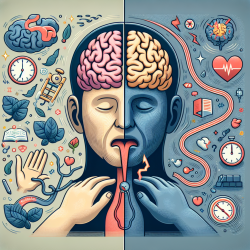Transforming Diabetes Education: Insights from Brazil's Groundbreaking Study
As a special education director, I am constantly seeking innovative approaches to enhance educational programs within our district. Recently, I came across a compelling study titled "Patient education program for Brazilians living with diabetes and prediabetes: findings from a development study," which offers valuable insights for healthcare practitioners aiming to improve their educational strategies.
The Study's Core Findings
The study highlights the development of a structured patient education program tailored for Brazilians living with diabetes or prediabetes. It emphasizes the need for a comprehensive approach that includes:
- Self-management education
- Physical activity guidance
- Dietary advice
- Medication management
- Psychosocial support
- Sleep improvement strategies
These components are embedded in an 18-session educational program, strategically designed to support learning outcomes and improve patient engagement.
Implementing the Findings in Practice
For practitioners, incorporating the study's outcomes into practice can significantly enhance patient education programs. Here are some steps to consider:
- Needs Assessment: Conduct a thorough needs assessment to identify the specific educational requirements of your patient population. This involves reviewing current guidelines, conducting environmental scans, and engaging with patients and experts.
- Structured Curriculum: Develop a structured curriculum that aligns with the identified needs. Ensure it covers all critical areas such as self-management, diet, and physical activity.
- Cultural Adaptation: Tailor educational materials to the cultural context of your patients. This involves translating materials and adapting content to ensure relevance and comprehension.
- Interactive Learning: Incorporate interactive learning techniques such as focus groups and experiential activities to enhance patient engagement and retention of information.
- Evaluation and Feedback: Continuously evaluate the effectiveness of your program through feedback from participants and adjust the curriculum as needed to improve outcomes.
Encouraging Further Research
While the study provides a robust framework, it also opens avenues for further research. Practitioners are encouraged to explore the following areas:
- Long-term impact of structured education programs on patient outcomes
- Comparative studies between different cultural adaptations of educational materials
- Innovative delivery methods, such as online platforms, to reach a broader audience
Conclusion
The Brazilian study offers a promising model for diabetes education that can be adapted and implemented globally. By focusing on comprehensive, culturally sensitive, and interactive education, practitioners can empower patients to better manage their diabetes, ultimately improving their quality of life.
To read the original research paper, please follow this link: Patient education program for Brazilians living with diabetes and prediabetes: findings from a development study.










